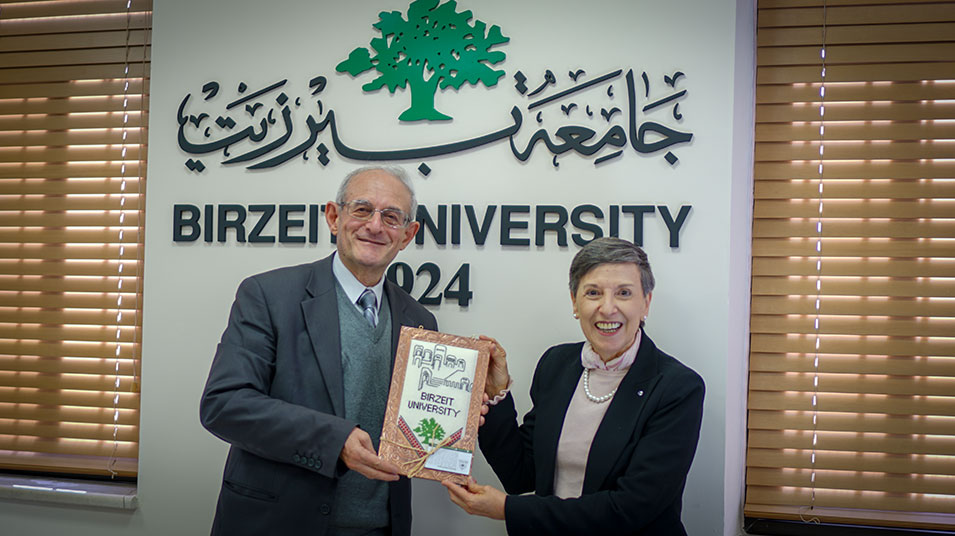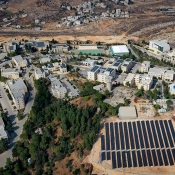Chair of Transparency International unveils tools to combat corruption through youth
The Faculty of Law and Public Administration at Birzeit University, in coordination with the Coalition for Accountability and Integrity (AMAN), hosted a lecture on the best practices in engaging youth in the fight against corruption featuring Delia Matilde Ferreira Rubio, the recently elected Chair of the International Board of Directors of Transparency International.
Ferreira Rubio, an internationally recognized activist and consultant on corruption and democracy issues, discussed her vision regarding the challenges in the fight against corruption, with a particular focus on the best means to engage youth.
At the beginning of the lecture, assistant professor of public administration at the university, Ayman Zaru, pointed to the university’s academic efforts to combat corruption, and spread the values of integrity and transparency among both the university and the broader Palestinian community. These efforts, according to Zaru, include publishing relevant books, teaching special courses to students, and issuing a Code of Conduct for the university’s faculty and staff.
Ferreira Rubio started the lecture pointing to the 25th anniversary of the fight against corruption in the world. She asked the widespread question: “Have you been successful?” regarding the accomplishments of Transparency International’s long-standing efforts to fight corruption in all disciplines. Between 25 years ago and today, according to Ferreira Rubio, people became more aware of the bad effects of corruption on attaining democracy, good governance, and achieving development.
Alluding to the 25-year development in the fight against corruption, Ferreira Rubio said, “These have been years of raising awareness of the severe consequences of corruption. Years of building the necessary legal infrastructure to prevent and sanction corruption.”
Ferreira Rubio explained that despite the enactment of many laws, rules, and standards necessary to combat corruption, they are not enough. She specifically stressed the role of youth to “embrace the cause of transparency, integrity, and solidarity,” using technologies such as social media platforms to facilitates mobilization, participation, demand for, and distribution of the basic values of democracy and peace.
Ferreira Rubio also stressed the implementation of what she called the “Four I’s,” which involves four lines of action: more information, more integrity, less impunity, and less indifference.
At the end of the lecture, Ferreira Rubio expressed her hope in the younger generation who will be able to eliminate corruption. “In many countries from Hong Kong to Ukraine, from Guatemala to Hungary, it has been the youth that initiated impressive and effective mobilizations against corruption. The youth today are more aware of the need to protect their future, not their individual futures, but the future of the society.”
“Let’s keep on working for integrity, equality, good governance, rule of law and a strong democracy,” Ferreira Rubio concluded her speech.
Prior to her lecture, Ferreira Rubio met with the university’s Vice President for Academic Affairs, Henry Giacaman; Vice President for Community Affairs Asim Khalil; Assistant to the President Aziz Shawbkah; and co-Founder of Muwatin Institute for the Study of Democracy and faculty member at the Department of Philosophy and Cultural Studies at Birzeit University, George Giacaman.
Delia Ferreira, born in Argentina, is the former president of Transparency International and the president of the Transparency International’s chapter in Argentina. She has been as chief advisor for several representatives and senators in the Argentine National Congress and has advised the Constitutional Committee of both the House of Representatives and the Senate, as well as the National Accounting Office. She worked independently on different programs to promote transparency, especially in the area of policy financing and public ethics, and in audit and anti-corruption projects with different international organizations
She is the author of numerous publications on democratic culture and political institutions, comparative politics, and public and parliamentary ethics.








